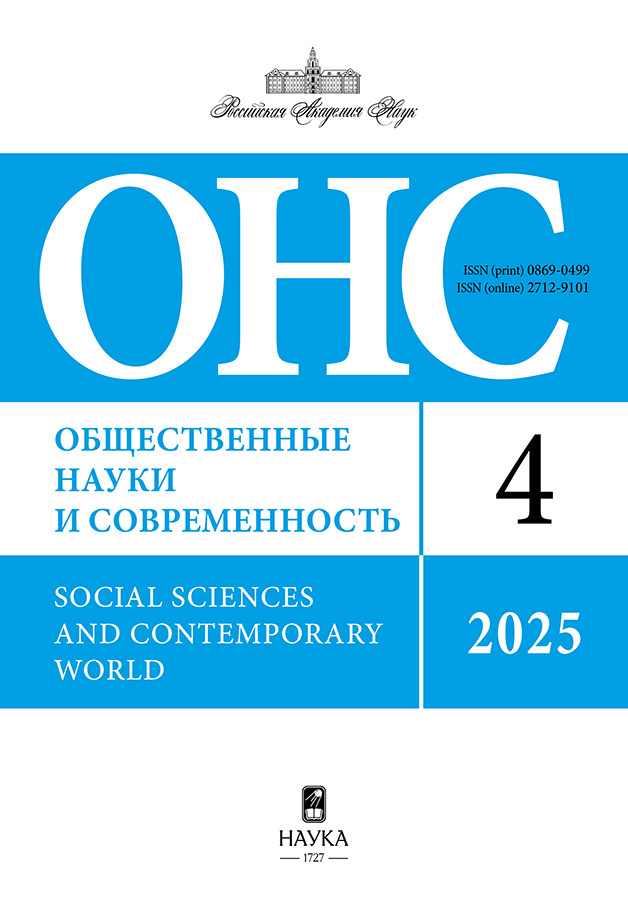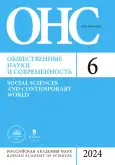From media literacy to media philosophy: western thought of the XXth–XXIst centuries on life in the information society
- Authors: Moskalenko N.M.1
-
Affiliations:
- Donetsk State University
- Issue: No 6 (2024)
- Pages: 111-123
- Section: Media studies
- URL: https://gynecology.orscience.ru/0869-0499/article/view/681328
- DOI: https://doi.org/10.31857/S0869049924060081
- EDN: https://elibrary.ru/JBCLAR
- ID: 681328
Cite item
Abstract
The problem of media literacy development, which is relevant for modern media studies, is considered in the context of the evolution of Western socio-humanitarian, including philosophical, thought of the last century. It is shown that the problem of the relationship between man and the world of information throughout this time has been of interest to authors who wrote not only about the media and their role in modern society, but also about the fundamental principles of human existence in a situation of crisis of individual and social identity. It is concluded that the relationship between man and society with the world of information and the media can be described by two models of media behavior. The first model assumes a low level of subjectivity of information recipients and, accordingly, their dependence on the policy pursued by the media. The second model describes a community with a high level of media literacy and therefore less susceptible to manipulative technologies of the media. It is noted that raising the level of knowledge about the media to the status of a section of philosophy, media philosophy, nevertheless leaves unchanged the main purpose of this new science, that is supporting and developing media literacy.
Full Text
About the authors
Natalia M. Moskalenko
Donetsk State University
Author for correspondence.
Email: n.moskalenko@donnu.ru
ORCID iD: 0009-0003-1566-7975
Senior Lecturer at the Department of Journalism and Assistant to the Rector
Russian Federation, DonetskReferences
- Архангельская И.Б. (2007) Теория коммуникации в трудах Х.-А. Инниса и Г.-М. Маклюэна // Вестник Нижегородского университета им. Н.И. Лобачевского. Серия «Социальные науки». № 3 (8). С. 148–153. Arkhangelskaya I. (2007) Communication Theory in the Works of H.-A. Innis and G.-M. McLuhan. Vestnik Nizhegorodskogo universiteta im. N.I. Lobachevskogo. Seriya “Social’nye nauki”. no. 3 (8), pp. 148–153. (In Russ.)
- Бадью А. (2013) Философия и событие. Беседы с кратким введением в философию Алена Бадью. М.: Институт общегуманитарных исследований. 192 с. Badiou A. (2013) Filosofiya i sobytie. Besedy s kratkim vvedeniem v filosofiyu Alena Bad’yu [Philosophy and Event. Conversations with a Brief Introduction to the Philosophy of Alain Badiou]. Moscow: Institut obshchegumanitarnyh issledovanij. 192 p. (In Russ.)
- Барт Р. (1989) Избранные работы. Семиотика. Поэтика. М.: Прогресс. 616 с. Barthes R. (1989) Izbrannye raboty. Semiotika. Poetika [Selected Works. Semiotics. Poetics]. Moscow: Progress. 616 p. (In Russ.)
- Беньямин В. (2012) Учение о подобии: медиаэстетические произведения. М.: РГГУ. 288 с. Benjamin W. (2012) Uchenie o podobii: mediaesteticheskie proizvedeniya [The Doctrine of Similarity: Media Aesthetic Works]. Moscow: RGGU. 288 p. (In Russ.)
- Бодрийяр Ж. (1999) Реквием по масс-медиа // В: Поэтика и политика. Альманах Российско-французского центра социологии и философии Института социологии РАН. М.: Институт экспериментальной социологии; СПб.: Алетейя. С. 193–226. Baudrillard J. (1999) Requiem for the Mass Media. In: Poetika i politika. Al’manah Rossijsko-francuzskogo centra sociologii i filosofii Instituta sociologii RAN. Moscow: Institut eksperimental’noj sociologii; Saint Petersburg: Aleteiya. Pp. 193–226. (In Russ.)
- Вартанова Е.Л. (2018) Медиаграмотность школьников и учителей в условиях цифровизации российского образования // В: Медиа в образовательной среде: коммуникации и безопасность детей. Ред.: Вартанова Е.Л., Фролова Т.И. М.: Факультет журналистики МГУ. С. 5–22. Vartanova E.L. (2018) Media Literacy of Schoolchildren and Teachers in the Context of Digitalization of Russian Education. In: Media v obrazovatel’noj srede: kommunikacii i bezopasnost’ detej. Eds: Vartanova E.L., Frolova T.I. Moscow: Fakul’tet zhurnalistiki MGU Publ. Pp. 5–22. (In Russ.)
- Визинг Л. (2013) Шесть ответов на вопрос «что такое медиафилософия?» // В: Антология медиафилософии. Ред.-сост.: Савчук В.В. СПб.: Издательство РХГА. С. 219–225. Wiesing L. (2013) Six Answers to the Question “What Is Media Philosophy?”. In: Antologiya mediafilosofii. Ed.: Savchuk V.V. Saint Petersburg: Izdatel’stvo RHGA. Pp. 219–225. (In Russ.)
- Вирно П. (2013) Грамматика множества: к анализу форм современной жизни. М.: Ад Маргинем Пресс. 176 с. Virno P. (2013) Grammatika mnozhestva: k analizu form sovremennoj zhizni [A Grammar of the Multitude: For an Analysis of Contemporary Forms of Life]. Moscow: Ad Marginem Press. 176 p. (In Russ.)
- Гадамер Х.-Г. (1988) Истина и метод. Основы философской герменевтики. М.: Прогресс. 704 с. Gadamer H.-G. (1988) Istina i metod. Osnovy filosofskoj germenevtiki [Truth and Method. Fundamentals of Philosophical Hermeneutics]. Moscow: Progress. 704 p. (In Russ.)
- Дебор Г. (2020) Общество спектакля. М.: Опустошитель. 280 с. Debord G. (2020) Obshchestvo spektaklya [Society of the Spectacle]. Moscow: Opustoshitel’. 280 p. (In Russ.)
- Казаков А.А. (2017) Медиаграмотность в контексте политической культуры: к вопросу об определении понятия // Вестник Московского университета. Серия 10. Журналистика. № 4. С. 78–97. Kazakov A. (2017) Media Literacy within the Context of Political Culture: Revisiting the Definition of the Term. Vestnik Moskovskogo universiteta. Seriya 10. Zhurnalistika. no. 4, pp. 78–97. (In Russ.)
- Кампер Д. (2013) Двуликий Янус медиа. Эстетизация действительности. Возмущение чувств // В: Антология медиафилософии. Ред.-сост.: Савчук В.В. СПб.: Издательство РХГА. С. 201–203. Kamper D. (2013) Two-Faced Janus of Media. Aestheticization of Reality. Outrage of Feelings. In: Antologiya mediafilosofii. Ed.: Savchuk V.V. Saint Petersburg: Izdatel’stvo RHGA. Pp. 201–203. (In Russ.)
- Кастельс М. (2000) Информационная эпоха: экономика, общество, культура. М.: ГУ ВШЭ. 608 с. Castells M. (2000) Informacionnaya epoha: ekonomika, obshchestvo, kul’tura [The Information Age: Economy, Society and Culture]. Moscow: GU VShE. 608 p. (In Russ.)
- Кириллова Н.Б. (2006) Медиакультура: от модерна к постмодерну. М.: Академический Проект. 448 с. Kirillova N.B. (2006) Mediakul’tura: ot moderna k postmodernu [Media Culture: From Modernity to Postmodernity]. Moscow: Akademicheskij Proekt. 448 p. (In Russ.)
- Киттлер Ф. (2009) Оптические медиа. Берлинские лекции 1999 года. М.: Логос/Гнозис. 271 с. Kittler F. (2009) Opticheskie media. Berlinskie lekcii 1999 goda [Optical Media. Berlin Lectures 1999]. Moscow: Logos/Gnozis. 271 p. (In Russ.)
- Кракауэр З. (2019) Орнамент массы. Веймарские эссе. М.: Ад Маргинем Пресс, Музей современного искусства «Гараж». 240 с. Kracauer S. (2019) Ornament massy. Vejmarskie esse [Ornament of the Mass. Weimar Essays]. Moscow: Ad Marginem Press, Muzej sovremennogo iskusstva “Garazh”. 240 p. (In Russ.)
- Луман Н. (2005) Реальность массмедиа. М.: Праксис. 256 с. Luhmann N. (2005) Real’nost’ massmedia [The Reality of Mass Media]. Moscow: Praksis. 256 p. (In Russ.)
- Маклюэн Г.М. (2003) Понимание медиа. Внешние расширения человека. М.; Жуковский: КАНОН-пресс-Ц, Кучково поле. 464 с. McLuhan G.M. (2003) Ponimanie media. Vneshnie rasshireniya cheloveka [Understanding Media. The Extensions of Man]. Moscow; Zhukovskij: KANON-press-C, Kuchkovo pole. 464 p. (In Russ.)
- Маркузе Г. (1994) Одномерный человек. М.: REFL-book. 368 с. Marcuse H. (1994) Odnomernyj chelovek [One-Dimensional Man]. Moscow: REFL-book. 368 p. (In Russ.)
- Мерш Д. (2013) Мета / Диа. Два различных подхода к медиальному // В: Антология медиафилософии. Ред.-сост.: Савчук В.В. СПб.: Издательство РХГА. С. 204–218. Mersh D. (2013) Meta / Dia. Two Different Approaches to the Medial. In: Antologiya mediafilosofii. Ed.: Savchuk V.V. Saint Petersburg: Izdatel’stvo RHGA. Pp. 204–218. (In Russ.)
- Мюнкер С. (2013) После медиального поворота. Семь тезисов о медиафилософии // В: Антология медиафилософии. Ред.-сост.: Савчук В.В. СПб.: Издательство РХГА. С. 243–247. Münker S. (2013) After the Medial Turn. Seven Theses on Media Philosophy. In: Antologiya mediafilosofii. Ed.: Savchuk V.V. Saint Petersburg: Izdatel’stvo RHGA. Pp. 243–247. (In Russ.)
- Уэбстер Ф. (2004) Теории информационного общества. М.: Аспект Пресс. 400 с. Webster F. (2004) Teorii informacionnogo obshchestva [Theories of the Information Society]. Moscow: Aspekt Press. 400 p. (In Russ.)
- Фуко М. (1996) Воля к истине: по ту сторону знания, власти и сексуальности. Работы разных лет. М.: Касталь. 448 с. Foucault M. (1996) Volya k istine: po tu storonu znaniya, vlasti i seksual’nosti. Raboty raznyh let [The Will to Truth: Beyond Knowledge, Power and Sexuality. Works from Different Years]. Moscow: Kastal. 448 p. (In Russ.)
- Фуллер С. (2021) Постправда: знание как борьба за власть. М.: Издательский дом Высшей школы экономики. 368 с. Fuller S. (2021) Postpravda: znanie kak bor’ba za vlast’ [Post-Truth. Knowledge as a Power Game]. Moscow: Izdatel’skij dom Vysshej shkoly ekonomiki. 368 p. (In Russ.)
- Хайдеггер М. (1997) Бытие и время. М.: Ad Marginem. XI, 451 с. Heidegger M. (1997) Bytie i vremya [Being and Time]. Moscow: Ad Marginem. XI, 451 p. (In Russ.)
- Хартман Ф. (2013) «10 тезисов» к дискуссии о возможностях теории медиа в эпоху информационного общества // В: Антология медиафилософии. Ред.-сост.: Савчук В.В. СПб.: Издательство РХГА. С. 289–291. Hartmann F. (2013) “10 Theses” for a Discussion on the Possibilities of Media Theory in the Age of Information Society. In: Antologiya mediafilosofii. Ed.: Savchuk V.V. Saint Petersburg: Izdatel’stvo RHGA. Pp. 289–291. (In Russ.)
- Хоркхаймер М., Адорно Т. (1997) Диалектика Просвещения. Философские фрагменты. М.; СПб.: Медиум, Ювента. 312 с. Horkheimer M., Adorno Th. (1997) Dialektika Prosveshcheniya. Filosofskie fragmenty [Dialectic of Enlightenment. Philosophical Fragments]. Moscow; Saint Petersburg: Medium, Yuventa. 312 p. (In Russ.)
- Юдин Г.Б. (2017) Рецензия на книгу: Хабермас Ю. Структурная трансформация публичной сферы. Исследования относительно категории буржуазного общества (2016) // Философия. Журнал Высшей школы экономики. Т. I. № 1. С. 123–133. https://doi.org/10.17323/2587-8719-2017-I-1-123-133 Yudin G. (2017) Book Review: Habermas J. 2016. Strukturwandel der Öffentlichkeit. Untersuchungen zu einer Kategorie der bürgerlichen Gesellschaft. Filosofiya. Zhurnal Vysshey shkoly ekonomiki. Vol. I, no. 1, pp. 123–133. https://doi.org/10.17323/2587-8719-2017-I-1-123-133 (In Russ.)
- Galaktionova T., Kazakova O. (2022) Multiliterate Person: The View of Students and Teachers // Media Education (Mediaobrazovanie). Vol. 18. Issue 2. Pp. 221–231. https://doi.org/10.13187/me.2022.2.221
- Hartmann F. (2000) Medienphilosophie. Wien: WUV. 343 S.
- Hobbs R. (2016) Epilogue // In: Exploring the Roots of Digital and Media Literacy through Personal Narrative. Ed.: R. Hobbs. Philadelphia (Pennsylvania): Temple University Press. Pp. 233–236.
- Hobbs R., Jensen A. (2009) The Past, Present, and Future of Media Literacy Education // Journal of Media Literacy Education. Issue 1. Pp. 1–11. https://doi.org/10.23860/jmle-1-1-1
Supplementary files









